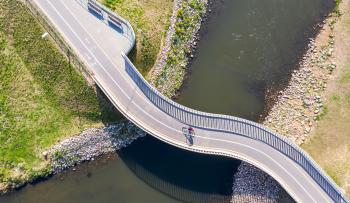
Car users pollute but do not foot the bill

Every car in Europe produces external costs of an equivalent of 1,600 Euro (on average) annually in noise, air pollution, greenhouse gas emissions and accidents, not covered by liability insurance. This is the key figure of a new study called “The true costs of automobility: External costs of cars” that was put together and presented in the European Parliament by Prof Becker, Chair of Transport Ecology from University of Dresden. Becker deplores that the basic principle of a market economy – the polluter pays the full costs him- or herself – is not applied: “These costs are charged to the whole society, to other regions and to future generations”, he says.
Becker’s other main findings include:
- For the EU-27, the overall sum of uncovered costs related to car use amounts to € 373 billion per year, the equivalent of roughly 3.0 % of the EU’s GDP or the GDP of Belgium. The report also gives detailed national figures for each of the EU-27 Member States.
- On average, every EU citizen pays € 750 of subsidies per year.
- Per vehicle km (vkm), external costs equal 13 Euro-cents on EU-average.
- 41 % of these external costs are due to accidents and 37 % to climate change. The remaining 22 % divide up on air pollution, noise and other effects.
The study did neither take congestion nor the full health costs - due to physical inactivity - into account. The main economic benefit of cycling is on the health side, due to physical exercise. Using WHO’s Health Economic Assessment Tool for Cycling, ECF calculated a health benefit of € 108 – 118 bn in reduced mortality at current levels of cycling in the EU-27.[i] Reversing this argument, door to door car journeys are a major reason for sedentary lifestyles – 35 % of the population in the WHO European region is insufficiently physically active. The WHO warns that child obesity will become one of the most serious public health challenges of the 21st century.[ii]
“That is what the fair deal [for cars] is about”: In efficient societies and market economies, “prices have to provide the right signals in order to increase efficiency and avoid irrational mobility choices,” Becker’s executive summary concludes.
About 50 % of all car trips in Europe are shorter than 5 km, a distance that could be easily cycled in many cases. ECF therefore fully supports the opinion of the author that external costs of motorized transport should be as completely and as quickly internalized as possible.
Notes to the editor:
Prof J. Becker, Thilo Becker, Julia Gerlach, The True Costs of Automobility: External Costs of Cars. Overview on existing estimates in EU-27. Dresden, October 2012. The study was commissioned by The Greens – EFA and presented on December 6, 2012 in the European Parliament.
The EN, FR and DE version can be downloaded here.
[i] Considering HEAT is designed for adult population, km cycled by the ‘0 to 19 years’ age group (i.e. 22 billion km/y, assuming the 0 to 15 age group cycle the same amount as the average, and the 0 to 19 age group 53% more than the average) are not taken into consideration (taking these into consideration could lead to an overestimation of the resulting benefits). Considering 7% of EU citizens cite cycling is their main mode of transport (Eurostat 2011), the remaining 72 billion km are spread as follows: 7% of the ‘20 years and over’ age group are assumed to cycle (5.8 km/day x 225days/year=) 1305 km/year (together 36 billion km); 43% of this age group is assumed to cycle the remaining km, i.e. 209 km/year (together also 36 billion km); 50% of the population is assumed never to cycle. Based on these assumptions, EU-wide health benefits due to reduced premature mortality is valued at € 110 billion/year. The higher figure (€118 billion/year) is obtained when spreading km cycled by the 20+ age group evenly across this entire age group.
Contact the author
Recent news!
Upcoming events
Contact Us
Avenue des Arts, 7-8
Postal address: Rue de la Charité, 22
1210 Brussels, Belgium









